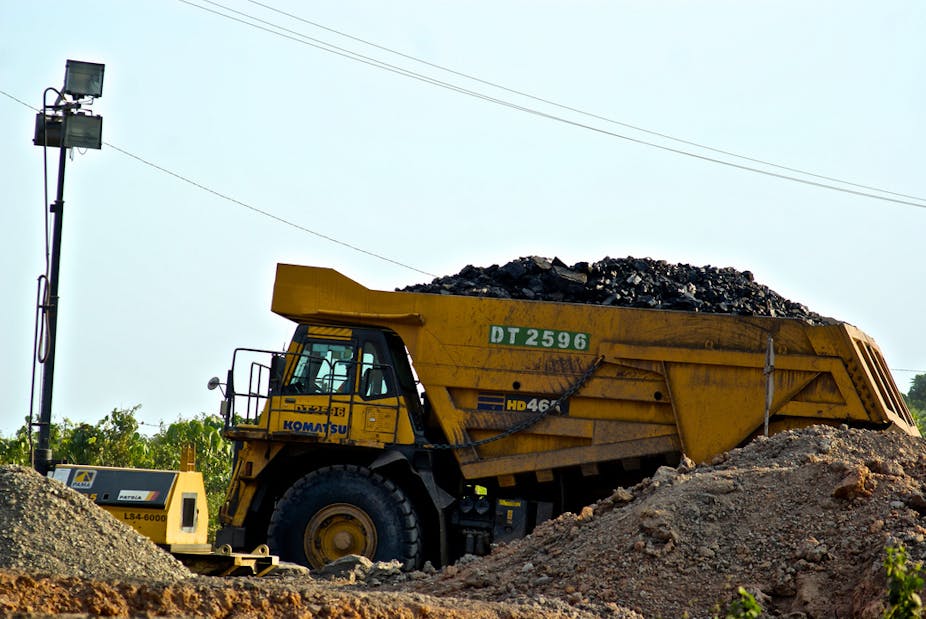Last week saw a shareholders’ meeting of the mining company Bumi plc in London.
Shareholders meetings are hardly unusual events. But this was no ordinary shareholders meeting. It involved a major Indonesian coal mining concession, and pitted two powerful businesspeople against each other.
One was Nathaniel Rothschild, a member of the Rothschild dynasty, well-established in the commercial worlds of Europe and North America, where the very name Rothschild stirs up images of wealth and power.
The other player is less well-known internationally: the Indonesian businessman Aburizal Bakrie.
Bakrie is one of Indonesia’s most powerful men. He is a major shareholder in (and former chair of) the Bakrie Group, a massive family conglomerate with interests in mining, plantations, education and the media, amongst others. He is also the chair of Golkar, the political party founded during the Suharto regime and for many years the electoral flagbearer for the former president. He is currently Golkar’s candidate for the presidential elections due next year, and already running hard in campaign ads on television.
He is a controversial figure for many Indonesians, and the combination of his political and business interests frequently draw adverse comment. Two years ago, for instance, he effectively brought down the best finance minister Indonesia had seen for decades, Sri Mulyani, in what was widely seen as a dispute over his payment – more accurately, non-payment – of taxes. Not a man you should lightly cross.
How did Bakrie and Rothschild get into business together?
In 2011, Bakrie moved his shareholding of the Indonesian-registered company Bumi Resources, owners of a major coal mining concession, into an investment vehicle set up by Nathaniel Rothschild, and subsequently renamed Bumi plc. Bakrie’s idea was to tap European sources of capital for Bumi Resources, without having to go though the difficult process of listing on the London Stock Exchange. Rothschild would gain access to a valuable coal mining concession in Indonesia, the world’s largest exporter of thermal coal.
Initially, the partnership seems to have worked well. But within a year of its establishment, tension between Bakrie and Rothschild over control of the enterprise became public.
Eventually, Rothschild moved to dismiss the Bakrie-appointed directors from the Bumi board, and Bakrie declared that he had had enough of the whole affair, and had decided to pull out, and to buy back Bumi Resources from Bumi plc.
This conflict was further fuelled when the British Takeovers Panel ruled that Bakrie and two other Indonesian corporate shareholders in Bumi plc were acting in concert, and therefore in violation of the Takeovers Act.
The shareholders meeting in London last week came out in favour of Bakrie: only two of Rothschild’s resolutions were passed, and Bakrie remained in control of the majority of directorships of the company. His divestment plan is moving ahead.
Is the conflict fundamentally about corporate governance and “emblematic of institutional investors’ worries about governance of foreign resources firms listed in London” as at least one commentator has suggested– as if only “foreigners” (presumably, non-Brits) are ever guilty of dubious business practices? Or is it really simply a clash between two very wealthy, very strong-willed businessmen over control of a valuable mining asset?
A bit of both, probably, but I suspect primarily the latter.
Any businessperson worth their salt knows that investing in Indonesia is a risky business. Relying on the courts to enforce contract conditions is foolhardy. Contracts stand and fall on the basis of the personal relationships the parties have, with each other and with other business and political players.
Rothschild is an experienced businessman. It is possible that he went in to the deal with Bakrie without knowing the nature of the person he was dealing with. Possible – but unlikely. In any case, it would have taken only a few minutes research to find out that Bakrie has a reputation for being a very canny operator.
Ironically, Rothschild demonstrated he is perfectly well aware of the links between business and politics in Indonesia when he proposed replacing Bakrie in Bumi plc with fellow Indonesian businessman Hashim Djojohadikusumo.
Hashim has business interests ranging from mining to agriculture to nature conservation, and a net worth reputedly just shy of $1 billion.
But he also just happens to be the brother of Prabowo Subianto, former son-in-law of the late President Suharto and currently leader of the Gerindra party and its declared candidate for the 2014 presidential election. Hashim was a co-founder of Gerindra, and still sits on its Board of Trustees.
Perhaps Rothschild simply wanted to bring Hashim’s business experience to Bumi plc.
Perhaps he gave no thought to Hashim’s political connections.
Perhaps.
But Rothschild might actually have faced an even bigger problem had he won control of Bumi. There is growing economic nationalism in Indonesia, directed largely at the mining industry. How long a foreign-registered company such as Bumi plc could have continued to mine Indonesian coal is a moot point.
Possibly, in the long term, Rothschild may benefit financially from his loss of control of Bumi.
Coal’d comfort?

